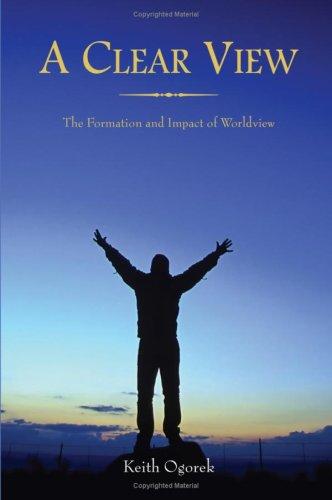A Clear View by Keith Ogorek

In the second chapter of Keith Ogorek's
A Clear View, he discusses the principles of truth and knowing. He focuses on the difference between the "upper story" and the "lower story", or the unseen world and the seen world...the "unlogical world" and the "logical world"... the focus on earth and the focus on Heaven.
Ogorek states that there are 3 ways to answer the question "what can we know". These ways are defined as follows...
1. Emphasize the importance of the upper story while diminishing or denying the significance of the lower story.
*this means to focus completely on what is unseen, and to ignore the things around you*
2. Diminish or deny the upper story while embracing the lower story
*to completely focus on the seen world, and on the things of the Earth, while ignoring the unseen*
3. Accept and embrace the existence and importance of both stories enabling a "unified field of knowledge"
*combining the view of the upper story and the view of the lower story to create a belief to include both sides
Different people have tried to define the position of the upper story and the lower story...
-Herodotus arugued that no one could understand the true nature of the universe, because it was constantly changing, therefore it is difficult to understand either story.
-Parmenides argued that the world was an unchanging thing, therefore it could easily be studied, especially in the lower story
-Socrates believed, contrarily believed that knowledge was a continual thing, and required constant learning
-Plato's beliefs echoed the belief of having both an upper story and a lower story. He argued that both were necessary in study and knowledge.
A man named Thomas Aquinas built upon what Plato and other great men had already touched on; the combination of the lower story and the upper story and how they work together. He outlined the separation of the upper story and the lower story as "grace" and "nature". As he further defined these two sections, he pointed out to people how the decision was left up to the individual and what they believed.
In the Aristotelian Movement, Aristotle insisted that presence and character of God could be studied. He encouraged people to study the "upper story", which angered many people of his time, but also moved others to action.
During the Renaissance, "nature" and the "lower story" began to over power "grace" and the "upper story". People started to pay more attention to what is seen, and the beauty of things on earth. They no longer felt the struggle of the two different stories as strongly. Many turned their attention to music and the arts- working to depict the beauty of earthly things.
Theology, philosophy, and art all took different paths, and branched out to explore new ideas. Artists, philosophers, and theologians no longer felt tied to certain paths, but started to follow different roads in un marked territories.
During the Reformation, great men like Calvin, Zwingli, and Luther worked to restore "grace" and the "upper story" to its proper position. They taught that it was solely Christ and the Scriptures that should dictate people's lives. During this time period, the balance was restored between the upper story and the lower story... grace and nature... the unseen and seen. As a result of the Reformation, people began to relate heavenly and earthly things together. They agreed with what Luther and others taught... that the material world should be respected adn revered, becasue they were created by God. The lower story is of importance because of its significance to the upper story... nature becasue of grace... the seen because of the unseen.
There is some more thoughts on Keith Ogorek's book
A Clear View.
(many ideas and thoughts are based on the book
A Clear View)


